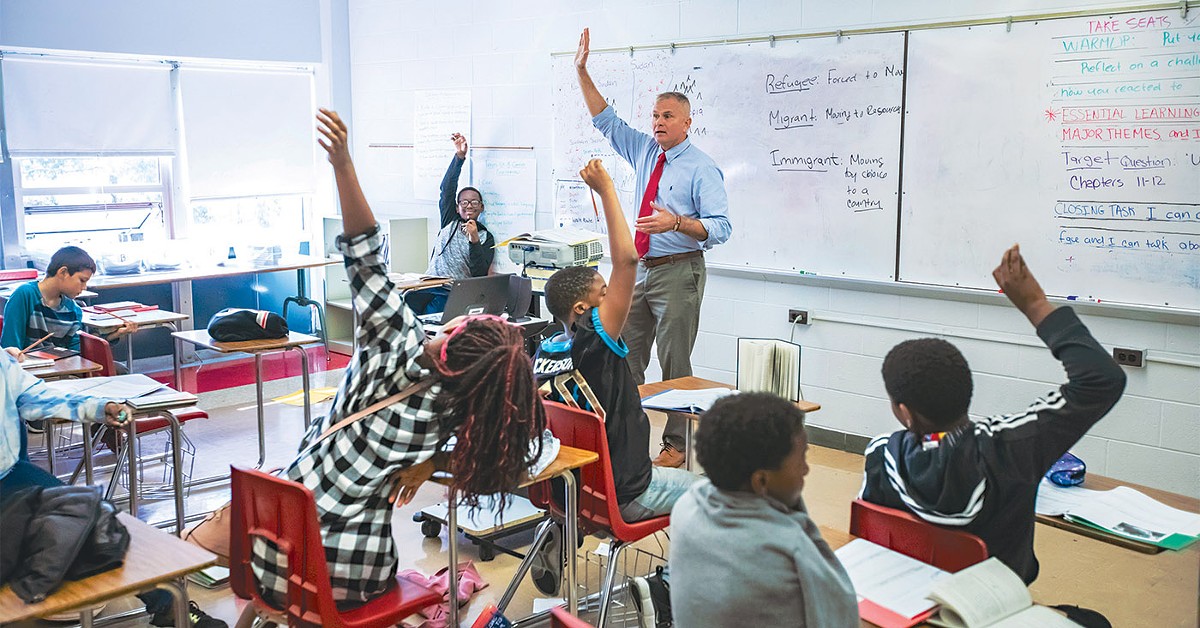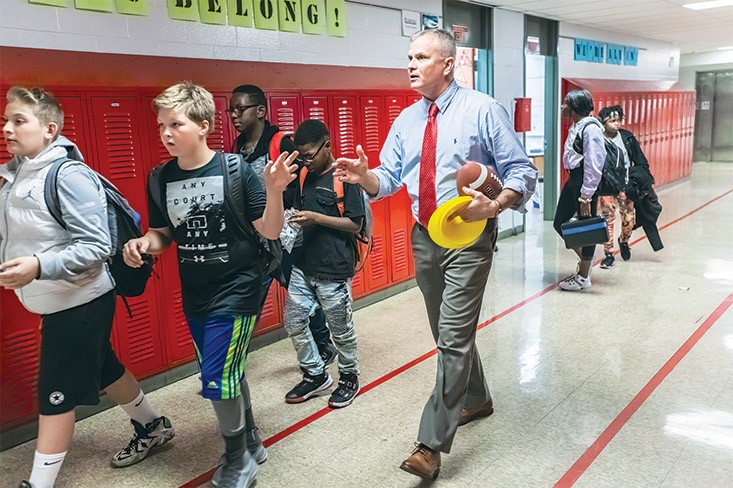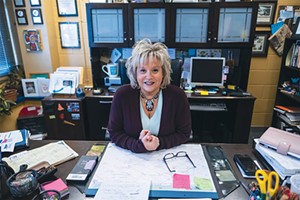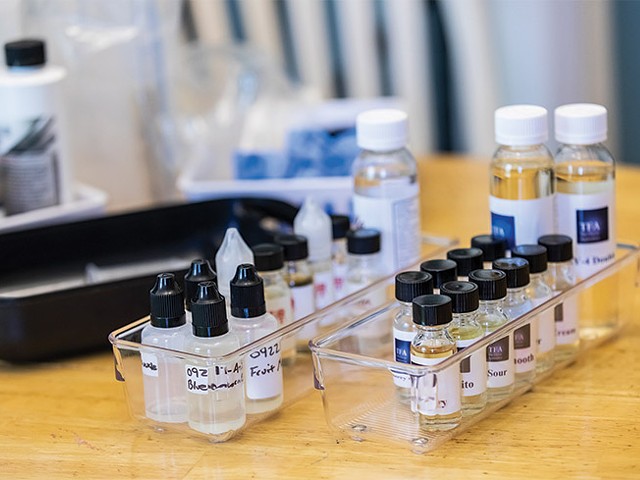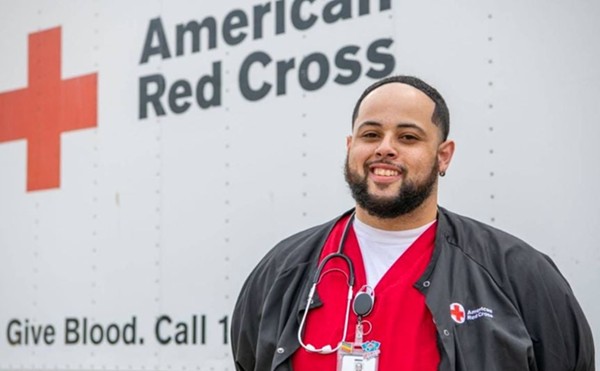Noise. Throbbing noise. It wasn’t just the volume though. It was as if I’d been locked in a broom closet with gigantic concert speakers blaring away with far too much bass. It pulsed and my whole body absorbed the sound in relentless waves.
When I walked into the Thomas Jefferson Middle School gymnasium for my first day as a teacher there, I was met by nearly 1,000 pubescent voices competing against one another to see which could be loudest. It felt like a tsunami was about to make landfall right on top of me.
Two young boys ran toward me at a breakneck speed, and as I braced for collision, they parted and just brushed past me. A group of kids eyed me as they strolled to the gym’s bench seats where they would wait for the start of school.
One asked, “Who are you?” in a way to suggest that I had no business being there.
“The new sixth grade social studies teacher,” I answered, trying to be upbeat.
They said nothing. They just smiled, suggesting an eerie satisfaction like wolves being presented with a baby lamb. Fresh meat.
I took it all in and thought, “My God. What have I done?”
Two weeks earlier I had just received a lateral promotion in my job as a consultant with one of the nation’s largest military contracting firms. It was a nice deal for me. Things were looking up.
Then, I read that there was a shortage of 150 teachers in Louisville, and it troubled me especially since school had already started. So, I did what most concerned citizens do these days: I went to Facebook to complain about the problem. I posted without really thinking, “I wish there was an easier way for veterans to get their teacher’s certification. I’d love to be able to teach.”
A couple of hours later a buddy sent a link to the Kentucky Department of Education where I could get my certification through a veteran fast-track program. I filled out the paperwork and received my teacher’s certification in a single day. I then applied to be a social studies teacher, and, in less than a week, I was hired to teach.
I resigned from my job as a consultant, and two days later there I was, a 57-year-old man in a gym full of extremely loud 11-, 12- and 13-year-olds.
It was all kinda mind-boggling.
I served in the Army for 29 years and achieved the rank of colonel — no small feat — and in addition to my great parents, my success was the result of the teachers I had throughout my life.
I stand on their shoulders.
Every child deserves an education. It is a right in our country.
I believe our shortage of teachers is a national emergency. I was given a call to serve again.
Standing in the gym that first day of school though, I felt as if I had been called to the gallows of my own execution. I had worked with kids before through programs where I’d volunteered like YouthBuild and Restorative Justice Louisville, but this was different.
I felt like Butch Cassidy and the Sundance Kid in the final scene of the Western movie. Surrounded, outgunned, outmanned and in a foreign country.
‘A Challenging Place’
Thomas Jefferson Middle School, or TJ, is located in a high-needs part of South Louisville, and the school is rated as having a low performing population with “one-star” in areas of proficiency, academics and growth. Ninety-eight percent of the students are on the free-lunch program. Forty-two percent of the students are African American, 27% are Hispanic or Latino and 23% are white. Eight percent are represented by other races and ethnicities. Thirty different languages are spoken at the school.
I had an idea of what I was getting into and the challenges I would face. It was made very clear to me in my interview for the position.
Ms. Kimberly Gregory, the principal, looked me straight in the eyes. She spoke with conviction and a directness I had not heard since I was in the Army, upon receiving a combat mission. She told me: “Thomas Jefferson is a challenging place to work. We take students from all over the city, most of whom require special attention. It is difficult. It is a very difficult task we have at hand here at TJ.”
She paused to let that information sink in and then continued, “We will ensure you have the resources and mentorship to be successful. We understand that you have not taught middle school before and you don’t have a degree in education. You will be given our best support. I’ll personally make sure of that. However, for those where much is provided, much is also expected.”
Another pause. Ms. Gregory did not blink. She leaned forward, interlocked her fingers in a loose prayer-like gesture, resting her hands on the table and she asked in a way it was clear that the truth was the only acceptable answer, “So, Col. Johnson, are you in or out?”
Unblinking. Direct, with no sign of emotion.
“If this is too much, we understand. It’s a lot of hard work. I wouldn’t blame you if you turned an offer to teach here down. Lots of challenges, but the rewards of being a Patriot [the TJ mascot] are greater than you can ever imagine.”
A final pause. Her head and shoulders became erect. Palms now flat on the table as if she was prepared to stand and leave if the answer did not meet her expectations.
“However, you have to know this. If you are in, you must be all in.”
I had not been truly all in for anything since my last combat deployment to Afghanistan seven years ago. And, frankly, I had not been motivated by a leader in what seemed like forever. I had long felt like Renée Zellweger’s character in the movie “Jerry Maguire” when she said, “Mostly, I just want to be inspired.”
I looked at Ms. Gregory and responded, “Absolutely. 100%. All in.”
Military Training Applies
As we prepared to escort the kids to class after the first bell, I mentally rehearsed my first interaction with the students in class. I knew this first engagement with the kids was singularly the most important event of the day and would set the tone for the next several weeks.
We marched the kids to class, trying to enforce the almost impossible task of ensuring they remained quiet and in single file. I was tempted to break out into military cadence of left, right, left but refrained because the kids didn’t know my personal history (but I would employ the tactic later as I built relationships with the kids). However, in many ways I had the confidence that I had done something like this before.
There are only two prerequisites for a veteran to receive a teaching certificate in Kentucky. First, you have to have a bachelor’s degree. Second, and even more important in my opinion, is that you have to have served honorably for six years. Most everyone who is in the military that long has achieved the rank and experience where they have been required to teach, manage and lead groups of people, specifically young enlisted personnel.
I served in the Army for nearly three decades and taught thousands of young men and women to perform incredibly complex tasks — many that required life and death decisions.
I knew how to deliver content, and that’s what teaching is all about, right?
Not even close, I’d soon learn.
However, there were skills from my military experience, not related to classroom instruction, that would eventually come in handy.
I led my students to the entrance of our classroom. For the most part, they ignored me as I tried to make small talk. I opened the door and they poured in like a crowd rushing through a Walmart on Black Friday. They pushed one another to find their seats. I did not think to assign seats — rookie mistake, and I paid for it.
Arguments broke out across the room.
I thought maybe a fight would ensue.
Things were spiraling out of control, and for a moment, I felt incredibly vulnerable, very much like the opening of a firefight. Confusion and disarray, everything going on at once. Sensory overload.
Then training kicks in. Management of chaos is a soldier’s special skill set.
I found “a point of domination” in the center of the classroom and began directing students to seats — anywhere, telling them to just find a place to sit, and we’d sort it out later. I asked for quiet and moved down aisles to contested areas. There, my size and presence made it uncomfortable enough to compel silence.
A general calm came over the classroom.
Other than the tapping of pencils and the shuffling of feet, there was very little noise. The quiet was almost unnerving after the morning of ruckus. Twenty-seven sets of eyes were on me. I was the adult, but I was not in charge quite yet.
I had a lesson plan that I had developed for the first day that included an introduction of myself. I also wanted to explain why I thought social studies was arguably the most important class they would take at TJ or any other school, for that matter. I told them that I applied the lessons I learned from the study of social science during my school years throughout my military career. I even explained how my understanding of cultures of other people, a central component of social studies curriculum, saved my life more than once. After all that, I wanted to introduce our first learning unit on Ancient Civilizations.
I asked for questions and, of course, the first was: “Have you ever killed anyone?” And the second was: “Have you been shot?” It is not something I like to talk about, let alone publicly, but I was honest with them, and then I told them a few war stories. They maintained their attention, but when I started teaching the importance of social studies, I quickly lost their interest.
Conversations broke out in pockets throughout the room. Out of the corner of my eye, I saw a paper ball sail toward another student and hit him in the chest. Kids started drumming with their pencils. I had to gain control of the class, and then I did what I said I would never do — I raised my voice much louder than I ever intended.
I got their attention.
However, they looked at me in a way as if to say, “Here we go again. I get this at home every single day.”
That hurt me, but I had to seize on the moment of silence and try to accomplish what should have been my only goal of the day — establish classroom expectations.
I never got to a discussion about Ancient Civilizations. In retrospect, it was probably too ambitious a task anyway. Instead, I spent the rest of the class talking about my expectations for the students’ conduct. This was completely off the cuff, but it centered on the Army Values of loyalty, duty, integrity, honor, personal courage, selfless service and, most of all, respect. I spent a long time on the idea of respect and how I demanded that they respect me and each other.
I concluded with an apology for losing my temper. I promised that I would try not to do it again, but I needed their help.
They left class in relative order as the next body of students lined up outside the door. The same scene repeated itself four more times throughout my first day, although, in subsequent classes, I ensured I didn’t raise my voice or show anger. It was very difficult because it’s a natural default with inexperienced teachers like myself. When school ended, I was totally exhausted, but my workday wasn’t over.
Not even close.
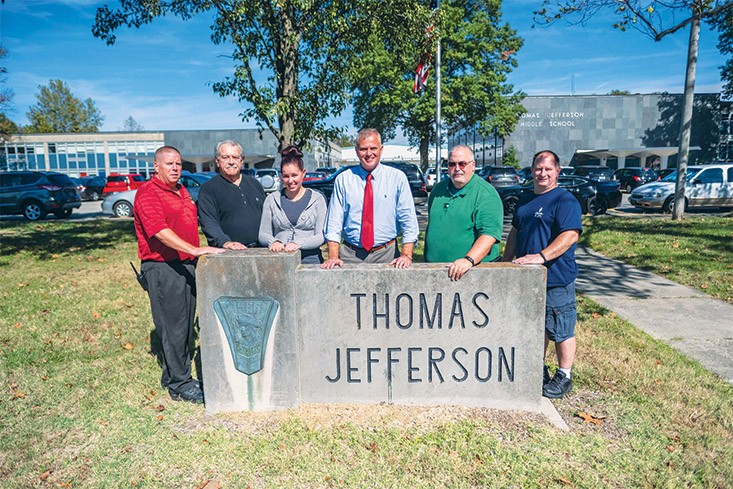
What Teaching Is Really Like
There’s this myth that school teachers have it “easy.” After all, we only have to work seven hours a day, 10 months out of the year, with all holidays off to included extended breaks.
Easy? Nonsense. Complete nonsense.
First, many of us arrive at 6:30 a.m. to prepare the classroom for instruction. Then after teaching from 7:30 a.m. to 2:30 p.m., we have to prepare for the next day, which can take several hours, especially if you have to make copies for materials from the one operational copier we have at school. I’m easily putting in 10 to 12 hours a day. Plus, Sundays are almost exclusively dedicated to preparing lesson plans and grading.
It’s really a six-day workweek.
I can say that the holidays and breaks are nice to have. However, it was very similar to when I was in the Army where we had 30 days paid leave a year and extended time off where we received a four-day weekend every federal holiday.
The similarities between teaching and the military are uncanny in ways that I never expected. This is especially the case at Thomas Jefferson Middle School where our principal, Ms. Gregory, established our motto for the year as “Survive and Advance.” In fact, our school shirts have that quote with a design of soldiers rappelling out of a helicopter to the ground.
Ms. Gregory also publishes weekly guidance in a letter to all teachers called, “Battle Plan.” This format is very familiar to me, and, probably, it is to all veterans because we received our leaders’ directives in what is called “The Commander’s Intent,” which drives all military operations. The idea behind The Commander’s Intent is that it provides you focus and purpose but it does not tell you how to achieve the mission. It’s a beautiful thing in its simplicity and the opportunity it provides for initiative.
After class and before I started working on the next day’s lesson, I read all of Gregory’s Battle Plans that she had published before I arrived at TJ. I hoped that they would provide me with some ideas on how to better manage my classroom. In her second Battle Plan published a week before I arrived to TJ she wrote:
“Be the CEO of your classroom. Send the message that you are in control and worthy of their respect. Communicate to your kiddos your absolutes and nonnegotiables, and then don’t waver from them. They will test them because conflict is a part of growing up, but be firm AND stay firm. Keep your absolutes to a minimum ... Discuss them, practice them and reinforce them to ensure kiddos understand your expectations. And work hard to strike a balance between being approachable without being their friend; and firm without being inflexible.”
It was signed Gen. Kimberly. Seriously, it was.
This was precisely what I needed. And, in the days and weeks that followed, I would apply this guidance along with the other pearls of wisdom from Gen. Kimberly’s Battle Plans. However, I found that teaching, like the military, is a team sport, and my most important learning came from my colleagues and members of my “TJ Family,” The Challengers. It is just like in the Army where our battle units had nicknames like Arrowhead and Polar Bears. We have the same pride and esprit de corps.
The Challengers include Ms. Karrick, our Family Leader, who teaches language arts. Yes, we have a chain of command, and we do not address one another by our first names, even when we are in private and not around the kids. It is the nature of the profession like the military where you are called by your rank — sergeant, lieutenant, etc.
I am kind of an exception though because my colleagues and students refer to me as Col. Johnson. I appreciate that sign of respect for my military service more than any of them will ever know.
Other members of the Family include Mr. Schaller who teaches special needs, Ms. Mitchell who teaches math, Ms. Galensky who teaches science and Ms. Weant who teaches reading intervention. Dr. Forest and Ms. Brown are part of our extended family that serves our team and other teams as resource teachers.
We are indeed a team of teams, and just like Ms. Gregory promised, I have all the support I need to accomplish my mission. I’m even given a coach, Ms. Ransdell, who leads TJ 101, which is a program developed to train new teachers on every aspect of our job. And there is also Mr. Stigall and Ms. Cheatham who assist when we have behavior challenges with students that require special attention.
I was also very happy to learn there were other military veterans serving as teachers at TJ. In fact, the vice principal, Mr. Rock, is also Capt. Rock in the Kentucky Army National Guard. As Capt. Rock, he deployed to Iraq as a military police officer, and he said of the support he received, “When I deployed to Iraq, my colleagues here enveloped my family as a Patriot Community. Every week someone signed up to check in with my wife, maybe provide a meal, took our kids to activities sometimes with their kids, sometimes with them (going to their house to play video games).”
What Mr./Capt. Rock described there is what we call in the Army, a Family Covenant, and it reflects why service members can go off to war and not worry about their loved ones at home. Teachers and staff at TJ support the military by helping fill this need.”
I will be so bold as to say that teaching at Thomas Jefferson Middle School is more like the military than the military. In many ways, teaching embodies the ideals of the Armed Forces but even more so because we are performing our strategic and tactical missions every single day we enter a classroom without fail, and that is to teach the children who are the future of our nation.
I deployed to combat four times serving over three years in war zones during my 29-year career. I am not going to say teaching is like combat, but I will assert it is harder than combat. And we do it every single day of the school year. Then, we get a little R&R, just like for deployed service members, and we are right back at it the next year.
I retired from the Army five years ago. In that time, I’ve had four jobs including my current position as a teacher. Frankly, that is not unusual for veterans who spent their adult lives in military. In our transition to the civilian sector we become searchers to regain the sense of purpose we had in uniform.
We seek our “Why.” And, I think I’ve found mine.
What Makes It Worth It All
For the last month that I’ve been a Patriot teacher at TJ, I have gone to bed with the faces and names of my students in my head, and I wake up to them the next morning. My “Why” is these students who on any given day drive me to point of insanity because that is the nature of middle schoolers. But they give back so much more when I see the light of learning come to their eyes and the words of understanding from their mouths.
And then there’s this.
I was having a particularly difficult day. I broke up a fight between two students in my classroom and had to make a call to bring them to the vice principal.
Once the unruly kids were removed from class, the other students remained unsettled. I performed all the skills in my newly developed arsenal to manage the classroom, but they failed.
I refrained from raising my voice and just went silent.
I said nothing but sat on an empty desk and crossed my arms.
I felt utterly defeated.
In my silence and display of resignation, the room quieted. One student raised her hand. I acknowledged her and she asked,
“Col. Johnson may I give you a hug.”
I smiled, and the student got up from her seat and did just that. •

